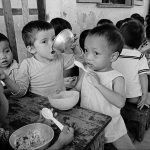China Closes Foreign Adoptions, Leaves Families Devastated
Thousands of abandoned children will still need help.

Families waiting to complete the legalities of the adoption process and bring their children home from China were devastated last week when China announced it would end international adoptions.

Photo by Naomi Shi / Pexels / Creative Commons
The decision announced on September 5 by Foreign Ministry Spokesperson Mao Ning brings the 30-year program to an end, with exceptions for international residents adopting blood relatives or stepchildren. The program officially ended August 28.
Adoptive families and agencies are reeling from the news after thinking things had improved after many delays due to the COVID-19 pandemic.
Late last year some 16 adoptions by families who had been matched with Chinese children were able to complete the process, according to the U.S. State Department.
The State Department is “seeking written clarification from the [People’s Republic of China] authorities regarding the impact on intercountry adoption cases already in process and will maintain close communication with Adoption Service Providers and prospective adoptive parents.”
Lifeline Children’s Services, the largest evangelical adoption ministry in the U.S., had about 48 families who had been matched with Chinese children and were in shock and disbelief at the news, Karla Thrasher, senior director of international adoptions at Lifeline, told Baptist Press.
“Some of them were just a couple of pieces of paperwork away from traveling to meet their children and finalizing their adoption,” Thrasher said. “That’s how close many of these families were.”
Several of the families had met the children and spent time with them in their homes through a hosting program put on by Lifeline.
Thrasher said Lifeline will pray with and for the families as they grieve their loss, and help them consider their options.
Access to MinistryWatch content is free. However, we hope you will support our work with your prayers and financial gifts. To make a donation, click here.
Cherish Children Adoption International (CCAI) was started in 1992 by Joshua Zhong and Lily Nie, two Chinese immigrants with “an unwavering love for and dedication to China’s orphans.” Today it is the largest adoption agency for Chinese children in the world, having placed over 12,800 children into adoptive homes.
But 150,000 Chinese children are still waiting, according to CCAI.
Zhong told MinistryWatch the announcement by the Chinese government was not expected. The families they serve had been “holding on to hope that one day everything would get back to normal after the pandemic.”
He said China’s program for international adoption was considered a model for the world with more transparency and less corruption than others. It had been praised by the United States government.
The decision devastated CCAI families, several dozen of which have a final invitation to travel to China and several dozen more who have been formally matched with their adoptive child.
“We are reaching out, calling, praying, and crying with them. We are facing the challenge together,” Zhong said. “These families believe these are their children.”
Zhong said CCAI will offer information about other countries, but wants to be sensitive — many families felt a calling to adopt from a specific country. Some may want to learn more about other countries while others may just need to take a break.
The children left in China will also be impacted, and Zhong doesn’t know whether they will receive the appropriate counseling, especially those who were expecting to be adopted.
The Chinese program is better equipped with resources than it was 30 years ago. CCAI will continue its charitable efforts, including childcare, foster care, medical services, educational funds, and disaster relief to help the thousands of abandoned children in China.
Nightlight Christian Adoptions’ China program has been facilitating adoptions of waiting children with an identified medical need or an older child.
According to its president Daniel Nehrbass, Nightlight plans to cease its work in China and “find alternate countries for [its] families to adopt from.” In fact, many of Nightlight’s adoptive families had decided it was time to either halt their adoption plan or to choose another country due to delays in China.
When asked if he thought the decision by China would be reversed, Nehrbass was skeptical. “I cannot think of an instance where the foreign country unilaterally closed adoption and then reopened it with the U.S.,” he told MinistryWatch.
Nehrbass is particularly concerned about the plight of Chinese children with disabilities, a condition that bears a cultural stigma in the country. He urges Christians to pray the Gospel will change the culture of China (and the U.S.) so “people change the way they think about their fellow image-bearers.”
Bethany Christian Services, which has facilitated 15,000 international adoptions over its 40-year history, including from China, decided not to renew its international adoption credentials in March 2021 when they expired.
It cited the changes to international adoption practices that have often made international adoption nearly impossible. Children are also being adopted by families in their country of birth more often.
Bethany believes it is preferable to allow children to stay in their home communities, but also makes financial sense to empower local families to care for their children.
“For example, the average international adoption for one child through Bethany costs approximately $50,000. With that same amount of money, we can help 50 children in our Africa programs leave an orphanage and find loving foster or adoptive homes nearby,” Bethany said.
TO OUR READERS: Do you have a story idea, or do you want to give us feedback about this or any other story? Please email us: [email protected]








